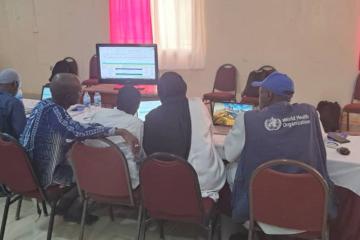Tendaba, The Gambia – In a concerted effort to address the rising tide of cancer cases in The Gambia, the World Health Organization (WHO) is spearheading a landmark initiative to develop the nation’s maiden cancer control strategy. Amidst this endeavor, a pivotal four-day meeting of experts is currently underway at Tendaba Camp in the Lower Region, marking a crucial milestone in The Gambia’s fight against cancer.
The strategic plan, meticulously crafted with WHO’s guidance, delineates a comprehensive roadmap aimed at curbing the incidence of cancer and enhancing access to essential screening, diagnosis, treatment, and palliative care services across the country. With ambitious targets set for 2030, the strategy encompasses multifaceted interventions designed to reduce the burden of cancer, bolster healthcare infrastructure, and foster collaboration among stakeholders.
At the forefront of this strategic blueprint are key objectives, including the reduction of new cancer cases attributable to modifiable risk factors by 2% by 2030. Additionally, the strategy aims to enhance the capacity of healthcare facilities to provide screening, early detection, and treatment services, with a target of expanding coverage to 20% of the population. Moreover, efforts are underway to strengthen cancer surveillance, research, and strategic information systems, laying the groundwork for evidence-based interventions tailored to local disease burdens.
Recognizing the imperative of multi-sectoral collaboration, the strategy underscores the establishment of a high-level mechanism for coordination and partnership, aimed at fostering synergy among diverse stakeholders in the fight against cancer. Moreover, advocacy, resource mobilization, and communication mechanisms are being instituted to galvanize support from civil societies, communities, and development partners, amplifying the impact of cancer control efforts.
Central to WHO’s mission in cancer control is the promotion of national policies and programmes aligned with global strategies for noncommunicable diseases (NCDs). By setting norms and standards for cancer control and fostering monitoring and evaluation mechanisms, WHO endeavors to equip nations with the tools needed to combat cancer effectively.
The Republic of The Gambia’s strides in cancer control have not gone unnoticed. A team of experts from the International Atomic Energy Agency (IAEA), WHO, and the International Agency for Research on Cancer (IARC) recently conducted an imPACT Review in the country. This comprehensive assessment, spanning the entire cancer continuum, has laid the groundwork for the development of the nation’s first National Cancer Control Strategy.
Through rigorous evaluation and stakeholder engagement, the imPACT Review has identified critical areas for intervention, informing the introduction of The Gambia’s first radiotherapy facility. This milestone initiative is poised to revolutionize cancer care in the country, providing vital support to over 1000 new cancer patients diagnosed annually.
As The Gambia charts its course towards comprehensive cancer control, WHO’s unwavering support and expertise serve as a beacon of hope, illuminating the path towards a future where cancer is no longer a formidable adversary. With concerted efforts and strategic interventions, the nation stands poised to confront this public health challenge head-on, ensuring a brighter and healthier tomorrow for all its citizens.
>>> Read full article>>>
Copyright for syndicated content belongs to the linked Source : WHO Africa – https://www.afro.who.int/countries/the-gambia/news/whos-ongoing-support-paves-way-gambias-first-national-cancer-control-strategy
